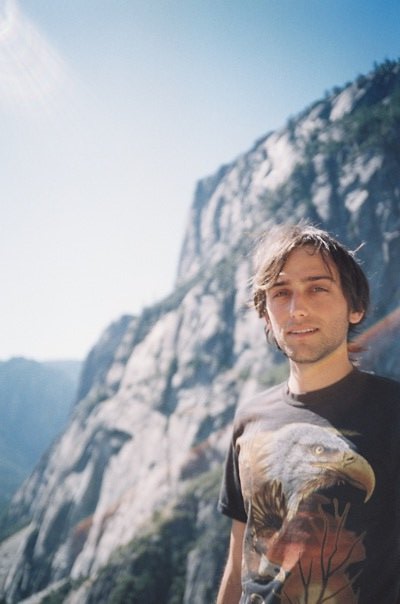I got to see Passion Pit's NYC debut so I thought I'd add to the wave of hype that they're riding.
They were glorious. They got everyone dancing, which is impressive given the limited availability of their music. I'd listened to all the tracks the internet could muster beforehand, and was surprised by how cohesive the concert felt. Each song shared a Passion Pit flavor which lent itself heavily to Michael Angelakos' shouting. The songs were all at a quick, danceable tempo, and used poppy chord sets backed by steady synths. There were also some sudden, stop-and-go parts that worked better at exciting people than classic electro buildups.
Though everyone seemed to agree with me about their amazingness, thoughts were mixed about Agelakos' mentioned voice. For me, the way he flailed around high pitches gave a delightful harshness to the music, but this same trait bothered others. Still, I don't see this stopping them. A crowd that size doesn't go crazy for a band that hasn't released anything labeled unless something's up.
Visit them at myspace and last.fm to get all the tracks.
Thursday, August 14, 2008
Sunday, August 10, 2008
Soundtracks
I've always been huge fan of filmscore. It was the gateway that lead me to find all that I love so dearly now. If you were impressed by Johnny Greenwood's excellent step into genre, then it would be in your best interest to at least check one of these out. In fact, if you are the kind of music listener that hates instrumental music, it might still be interesting for you to know who sets the mood for some of your favorite movies, and if you are a fan of filmscore, you probably already own all of these.
No particular order
No particular order
- Clint Mansell - The Fountain
After making Requiem for a Dream, Aronofsky set out on creating this film and released it to a bit of disappointment. Despite the fact that the movie recieved mixed reviews, the score is a brilliant piece of sorrowful strings. Without having seen the movie, you get a sense of the futility of the main character's pursuit. Mansell, as he did for Aranofsky's previous film, has much of the music performed by the Kronos Quartet, which has a history of bridging classical and experimental sounds. A theme echos throughout the soundtrack but in different tempos and styles to follow the similarities of each story in the film.
- Cliff Martinez - Solaris
Martinez's scores are less popular than the others on this list (despite his time spent drumming for the Chili Peppers), but the Solaris soundtrack is probably my favorite. It conveys a euphoric, yet poignant coma through a unique use of steel drums. The open space is filled with soft strings that provide a base on which melodies are built. The chords are common, but they are manipulated creatively through the instrumentation and the apreggiation.
- John Murphy - 28 Days Later
I've heard that Boyle was influenced by Godspeed You! Black Emperor when conceiving the film, and it's true that a bit of the film makes use of their music. Still, it's Murphy's work that dominates the movie. Scores can often sound tacky when making use of electric guitars and power chords (300), but 28 Days Later depicts destruction in a post-apocalyptic landscape with perfect fury. It's the song, In the House - In a Heartbeat, that stands apart and has since been given replay on current commercials and trailers.
- Johnny Greenwood - There Will Be Blood
This score is reminiscent at times of Richard Strauss who's music is commonly associated with 2001: A Space Odyssey and Arvo Pärt who is also included in the soundtrack. It's hard to imagine the movie without Greenwood's score which sets the mood before the viewer even understands anything about it's main characters.
- Jon Brion - Eternal Sunshine of the Spotless Mind
Brion's score is a bit overshadowed by some of Gondry's other choices on the album, but the actual film hears only the goofy, but melancholic piano that the composer chose as his main instrument. It's hard to listen to it and not imagine Jim Carey's almost silent voice over, but this is because of the inherent human quality it holds. Overall, it is soothing and minimal. The main melody seems uninterested in itself, and sounds as if it were on a slow walk.
- Yann Tierson - Goodbye Lenin
Tierson doesn't move very far from his earlier works such as Emelie. Piano and strings get full use like in Brion's mentioned work, but the tempo is quicker. The notes bounce along while the violins provide emotional stability. At the end of the album, the theme is given vocals which veer from the common design of the genre, but like the rest of the music, it stays true to the film. The whole compilation conveys dramatic thought and emotional stress.
Subscribe to:
Posts (Atom)



